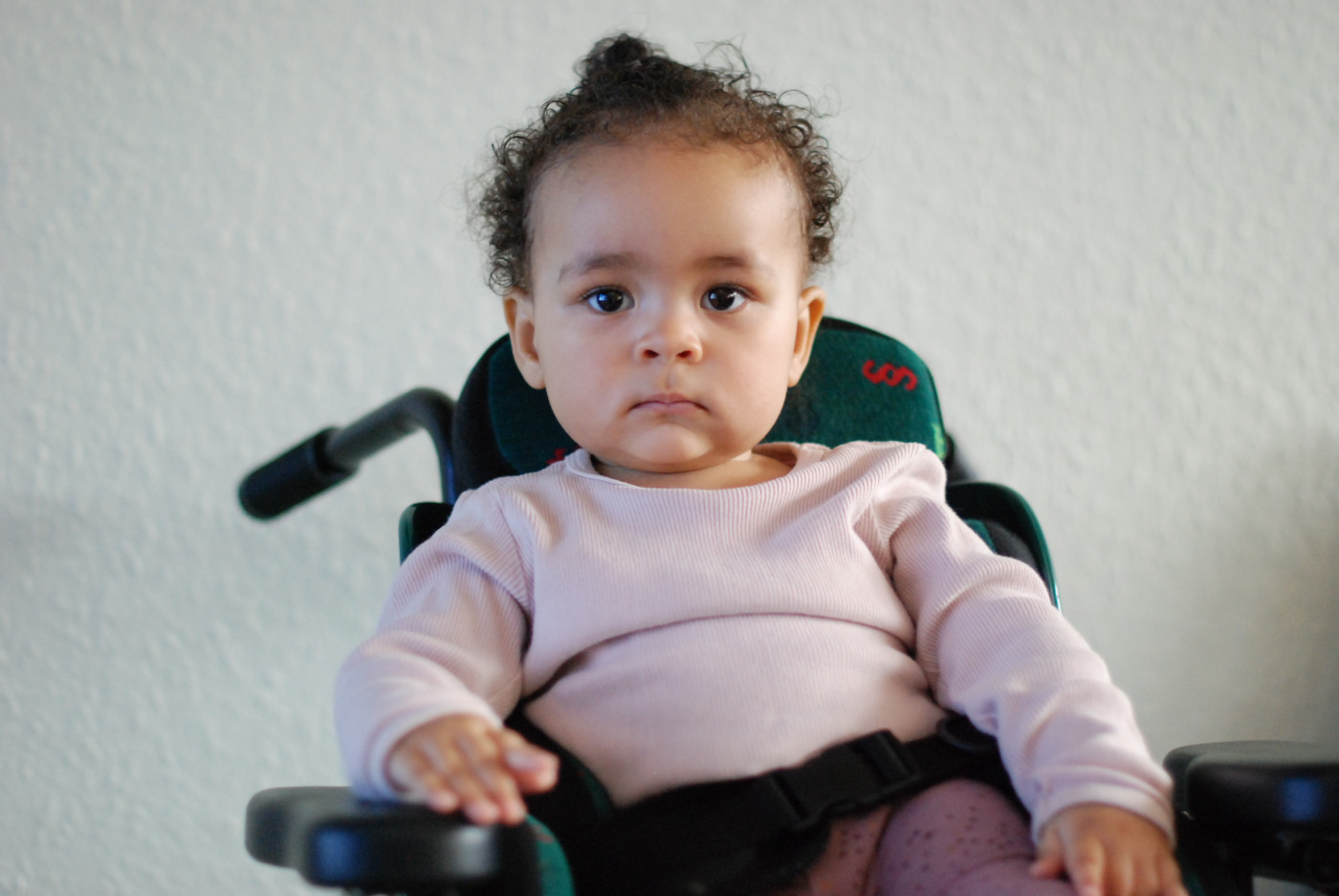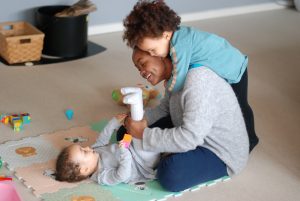Danish Family Races to Raise $2.4M for Daughter’s Zolgensma Therapy

Ayah, 1, in her wheelchair. (Photo by Charles Njuguna)
Ayah Lundt, a 15-month-old Danish girl with spinal muscular atrophy (SMA) type 2, is helping bring the world together as her parents race to raise $2.4 million for a single dose of Zolgensma before she becomes ineligible for the treatment when she turns 2 in January.
Ayah’s mother, Mary Mithika, and her father, Frank Lundt, have put together a team of volunteers in Denmark, in Mithika’s native Kenya, and in Germany to raise awareness and money for Zolgensma. The gene therapy, developed by Novartis, costs $2.125 million, making it the world’s most expensive one-time treatment. They’ve also set up a GoFundMe in the U.S. that’s raised more than $1.3 million to date.
The extra $300,000 Ayah’s family is adding to their goal is for travel to the U.S., living arrangements, and other costs related to the treatment they plan to get at Boston Children’s Hospital.
Between these fundraising efforts, Ayah and her group of volunteers have raised in total 9.3 million Danish krone (about $1.5 million). But the fight is not yet over, and her family still needs almost another $1 million to reach their goal.
“Ayah is like a legend to me,” said volunteer and friend Judy Kendi, who also hails from Kenya. “Ayah will be used like a testimony to say that when people come together, they can actually move mountains.”
In the latest fundraising attempt, an entertainment company, 254 Diaspora DJs Live In the Mix, had artists from Kenya to Dubai to the U.S. go live on YouTube and Facebook April 16–18 to raise funds for Ayah’s treatment. On Ayah’s Instagram page, solo artists sang and played guitar. Viewers donated $40,000 between that Friday and Sunday.
Going backward instead of forward
For the first nine months of her life, Ayah showed normal development, but her parents soon noticed something was wrong. Instead of progressing, she was regressing. Ayah’s primary care doctor directed them to a neurologist who ordered genetics tests, which confirmed an SMA diagnosis.
Mithika describes Ayah as a bubbly, intelligent baby who loves to play with her older sister, Amira, 2. Her physical condition hasn’t taken away from her mental acumen.
“She is smart; her brain has developed like a 15-month-old, but her body has not,” said Mithika, who lives with her family on the small island of Bornholm, south of the Swedish peninsula.
Ayah started on Spinraza (nusinersen; by Biogen) on Dec. 5, 2020. Spinraza, the first disease-modifying SMA therapy, was approved by the European Medicines Agency in 2017, and is available for reimbursement in Denmark. Mithika said that her daughter appears to have stabilized on this treatment, but hasn’t improved.
The consensus of all neurologists Mithika and Lundt contacted was that Zolgensma may be a better choice for Ayah, because it delivers healthy copies of the SMN1 gene that’s defective in this disease. Conversely, Spinraza increases the ability of the SMN2 gene to produce the SMN protein necessary for motor neuron survival, which must be injected directly into the spinal canal every four months.
However, Zolgensma is currently approved in the U.S. for children up to age 2. So as of her second birthday, Jan. 15, 2022, Ayah will no longer be eligible to receive it.
While Zolgensma was also given conditional approval by the European Medicines Agency, of which Denmark is a part, the Danish Medicines Council has not yet agreed to reimburse the medication under the country’s public healthcare plan, and it is not in use in that country.
The council’s primary concern is that some infants on Zolgensma have developed thrombotic microangiopathy, a treatable condition marked by blood abnormalities, destruction of red blood cells, and low platelet counts. The condition has led to one death out of the 800 people treated with Zolgensma so far, according to a Novartis letter to the European Medicines Agency.
“Zolgensma was approved in the European Union in May 2020, but has not yet received public reimbursement in Denmark. We are working closely with the Danish authorities and hope they will soon make a decision regarding the reimbursement of Zolgensma,” a spokesperson for Novartis said in a statement emailed to SMA News Today.
Hospitals in other EU countries also declined to accept Ayah as a Zolgensma patient, her mother said, with “most treating their own residents only.”
It takes a village
Mithika is Ayah’s caregiver, and Lundt is working as the sole provider of the family, but both have enlisted a growing team of friends, family, and strangers to hit the $2.4 million goal.
Kendi, who works as a full-time project manager and lives 18 miles outside Copenhagen in Ganløse, is devoting her skills to managing the core group of volunteers in Denmark by assigning them tasks such as taking photos and videos of the family, translating their story into different languages, writing to the government, appealing to companies to help them raise awareness, and drafting fundraising emails to prospective donors.
The core group of eight also enlist the help of volunteers spread through larger WhatsApp groups. But it didn’t all start in Denmark. A 10-person group in Kenya, led by Mithika’s sister Silvia, were the first volunteers to start raising awareness for Ayah. Now, people have also signed up to help in Germany and the U.S.
“We think we are more of Ayah’s soldiers,” Kendi said.
Social media has also spread the word about Ayah. About 25,000 people follow her on Instagram, and nearly 2,000 users follow her story on her Facebook page, Help Little Ayah. Over Easter weekend, Mithika hosted a 36-hour Instagram live on Ayah’s account and raised 7 million Kenyan shillings (about $70,000).
Mithika stayed awake for the whole 36 hours, and Kendi, who checked in toward the end, said her eyes were puffy from lack of sleep.
“That really impacted me to think about myself as a mother and to see that you need to give it all to your child,” Kendi said. Her daughter, Ofelia, is a mere 10 days younger than Ayah.
Ayah’s family is quite private, but they’ve forced themselves to be active across social media and enter the public eye to help raise money for their daughter. So far, it seems to have worked — a CNN story helped their U.S. GoFundMe soar past $1 million in the span of 24 hours between March 31 and April 1. They had only raised $60,000 up to that point.
“It was a tough decision because neither of us was out there on social media, but we just had to take a leap of faith,” Mithika said.
She is also hoping to build a movement, similar to the ALS Ice Bucket Challenge, that gets them the additional $1 million they need to afford Zolgensma out of pocket. It’s called $2 Sunday, with the hope of getting 1 million people to skip buying a snack or a coffee and send the $2 their way. If they reach enough people, it would put them over the amount they need.
A new family
The core group in Denmark meets once a week on Tuesday night to check in with Mithika and brainstorm how to raise more money. But it’s not always about fundraising. Sometimes, Kendi says, it’s a chance for the volunteers, who have now become like family, to comfort Mithika with her own emotional struggles caring for Ayah.
“We live in a world where you always hear about the bad news, and people coming out to support us gives us so much hope,” Mithika said.
In the meantime, Mithika is making sure Ayah retains as much function as possible. She incorporates physical therapy and exercise into their daily activities — from hydrotherapy in the shower to leg workouts during diaper changes. Ayah’s only piece of medical equipment is a CPAP machine, which they use twice daily to retain her lung function.
Ayah frequently appears on social media videos across Instagram and Facebook, using her favorite work, “tak,” which means “thank you” in Danish. It’s fitting, given the support she and her family have received through the ups and downs of her short life. Giving up, though, was never in the picture.
“We just wipe our tears and say, ‘OK, let’s move forward, let’s look ahead at what to do,’” Kendi said.









